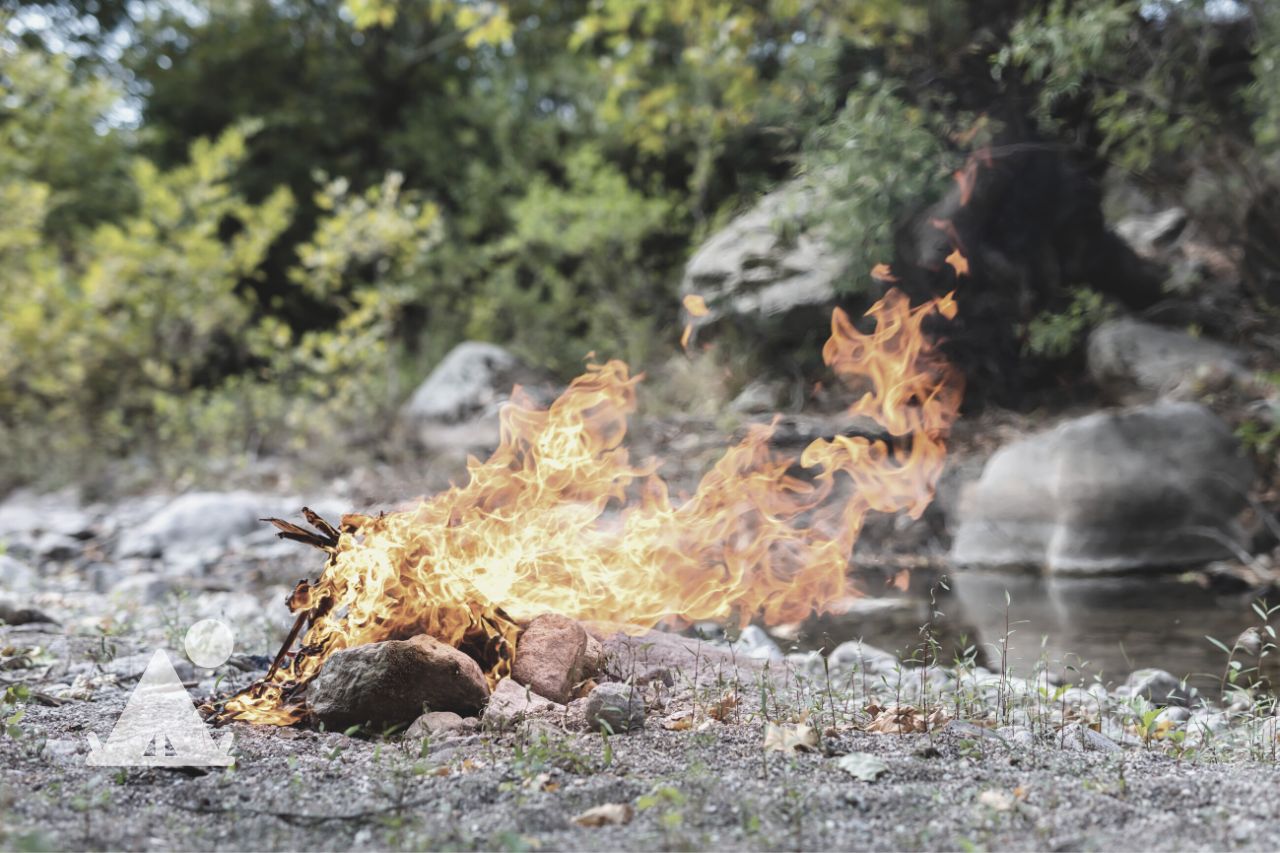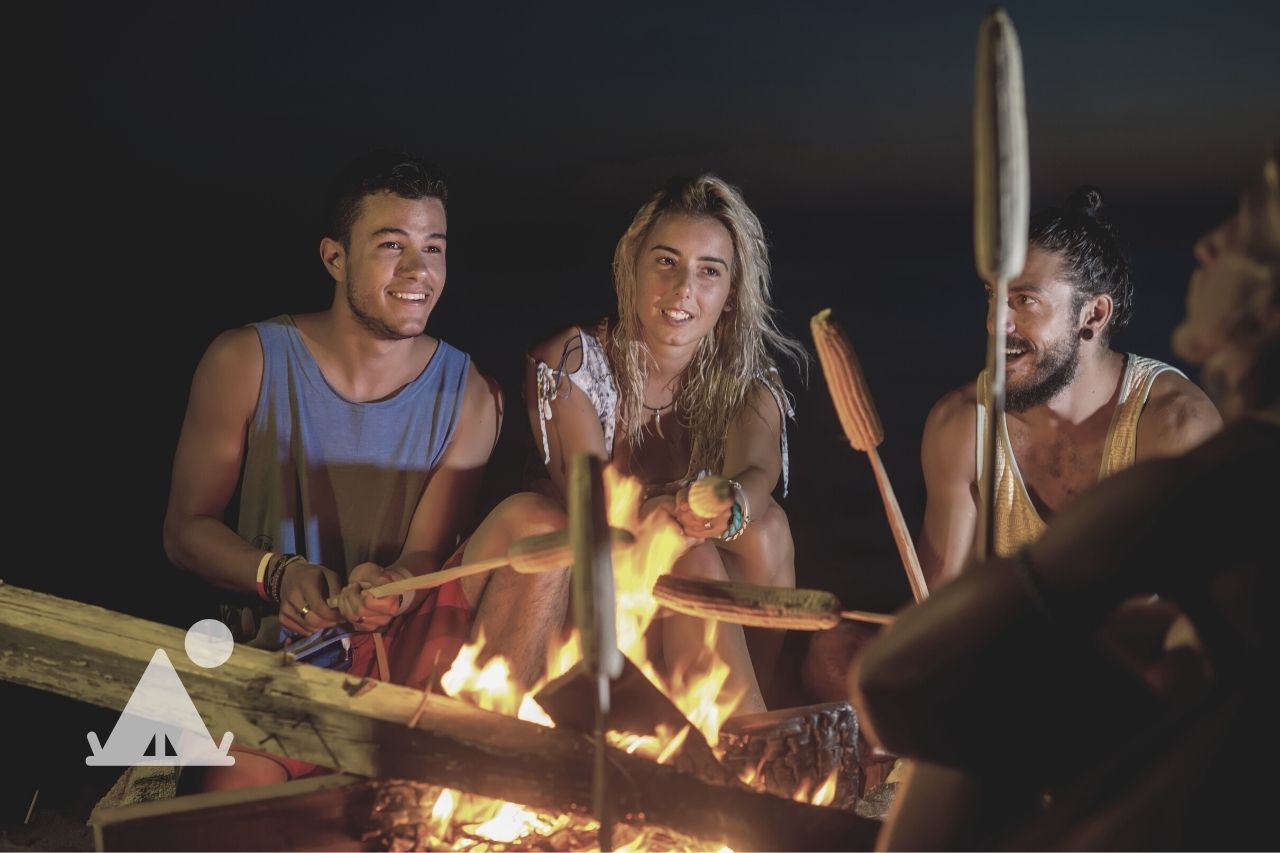Unattended campfires are one of the most common causes of wildfires. In this guide, we discuss fire safety when camping. This includes tips on starting and managing your campfire, as well as how to stay safe if you encounter a wildfire when camping.
6 Fire Safety Tips When Camping

Here are 6 important fire safety tips to keep in mind when planning a camping trip.
1. Research Your Planned Camping Location
Make sure you know as much as possible about where you are going camping. What’s the weather like there? What wild animals are found in the area? What’s the risk of a wildfire?
Researching fire risk is especially important during wildfire season. If the campsite is in a particular wildfire prone area, you can decide to change locations or practice additional precautions.
Most importantly, check whether there’s a wildfire burning in or close to the area (you can check current US wildfires here). If there is, it’s best to find another location. In any case, the campsite may have already been closed to visitors.
2. Carry Basic Fire Safety Gear
If there’s even a bit of risk that you might encounter a wildfire, pack basic safety gear.
Note: Don’t assume there’s zero risk of a wildfire just because it’s winter. According to the USDA, wildfires now occur throughout the year in all seasons.
You don’t have to pack firefighting gear; just some basic safety gear to help you get out safely in case of a wildfire.
Here are the essentials we recommend.
- Face masks that can protect you from toxic smoke and other fine particulates from a wildfire. N95 and KN95 masks are the best.
- Emergency GPS communicator like a personal locator beacon or a satellite messenger that enables you to call for help if you encounter a dangerous wildfire. Don’t rely on just your smartphone when going outdoors.
- NOAA weather alert radio – NOAA radio alerts can warn you of a fire emergency where you are. Get a battery powered radio that can receive these alerts. Our most favorite one is the Midland WR120B/WR120EZ NOAA Emergency Weather Alert Radio.
- Fire resistant hiking boots – these will protect your feet in case you have to walk through burning or recently burnt areas.
- Signal mirror – if you get caught in a wildfire, it can be heard for search and rescue to find your exact location because of the thick smoke. An emergency signal mirror is the best visual beacon in such circumstances.
In addition to the above, pack your usual camping safety equipment like a small ax, a first aid kit, a flashlight and so on.
3. Check And Follow Park Fire Safety Rules
Before you leave for the campsite, check fire safety rules for the park or camping site. For instance, some sites don’t allow any campfires, so you’ll need to pack a stove for cooking.
Check the park’s website or call the official number for all the rules and recommendations.
Once you get to the campsite, it’s also a good idea to check what’s posted at the entrance. Many campsites post the current level of fire risk and the corresponding measures that campers need to take.
4. Know How to Light And Manage A Campfire
Lighting a campfire may sound like a simple thing. But if you are a first time camper or you’ve never made a campfire, take time to learn how to do it right before you go camping.
Learning how to make a campfire not only makes the process easy and quick, it also ensures you don’t accidentally start a wildfire.
You also need to learn how to manage a campfire and how to put it out.
We have a more detailed section below on how to safely make a campfire, but here’s a video from REI to get you started.
5. Have A Backup Campsite or Hotel
Some unexpected rain or snowfall is unlikely to change your camping plans. But if you are going to an area that has a wildfire risk, we highly recommend having a backup plan.
Unlike snow or rain, you can’t really deal with a wildfire. The only option is to get away as far as possible in the opposite direction.
In your camping plans, note an alternative campsite or even a hotel that you can go to if wildfire keeps you from accessing your preferred campsite.
In some cases there will be no fire but officials may have closed that area of the park or a road leading to it. This is especially common during peak wildfire season.
6. Choose Your Campsite Carefully
If you plan to light a campfire, be careful when picking your camping site. Avoid areas that are exposed to the wind as that could quickly spread little fires and embers into a big and fast spreading fire.
As a safety precaution, try to find a place within a walking distance to a stream, river or lake so you can quickly extinguish an accidental fire. If that’s not possible, keep a bucket of water at hand in case you need to quickly put out a small fire.
Also, avoid camping near any potential fire fuel like dead trees or thick dry brushes.
It’s also a smart idea to prep your campsite to reduce the risk of a fire. Gather dead wood and place it in a pile far away from your tent.
If there are any dead branches or small trees, cut them down (if it’s safe to do so) and carry them away from your campsite.
Not only can they spread a fire, they are also a falling hazard.
How To Safely Start (And Manage) A Campfire

Here are tips on how to start and manage a campfire without starting a wildfire.
- Make sure campfires are allowed at the park or campsite. Some campsites don’t allow campfires of any sort ever, while others ban campfires at certain times of the year.
- Unless it is absolutely safe to do so, avoid large fires like a bonfire as they can easily get out of control. Some campsites have designated bonfire areas.
- Get rid of any flammable materials near the fire (e.g. dry twigs, dead branches etc.) and create a fire ring using rocks. You can also make a fire pit.
- Collect tinder, kindling and firewood to start a fire. In most campsites, you can get firewood locally but you’ll need to collect the tinder and kindling yourself. You can also use store-bought fire starters to light up firewood.
- Use tinder and kindling to start a fire and get the bigger pieces of wood burning.
- As long as the fire is burning, do not leave it unattended. Definitely don’t leave it burning when you go to bed.
- Don’t add too much firewood at the same time to avoid making the fire too big. Keeping the fire small and manageable reduces the risk of starting a wildfire.
- To extinguish the fire, douse it in water until all the embers are out and you don’t hear any sizzling.
What To Do If You Encounter A Wildfire When Camping
You’ll typically notice wildfire smoke long before you see the flames. This is the best time to take action.
If the smoke is closeby, get away in the opposite direction from which the wind is blowing. Do not wait to see the flames – it might be too late then.
If you wake up surrounded by smoke, try to find out where the wind is blowing and escape in that direction. Stay low on the ground and put on a face mask to protect yourself from the toxic smoke.
If you see a column of fire far off, you can stay where you are but keep a close eye on it. Erratic winds can quickly change the direction of a fire. If the column seems to be coming your way or if it’s getting bigger, it’s best to get out.
Watch where the column of smoke is bending towards. That’s where the fire is headed. Go in the opposite direction.
If the fire itself is close to you, don’t try to outrun it. Wildfires can be surprisingly fast especially when it’s windy.
Try to backtrack and escape in the opposite direction the fire is spreading. But this is only possible if the leading edge of the fire is not too wide.
If you cannot get away from the fire, find a safe hiding place. Some good places include a wide flat rock, a rocky slope, a lake, or in the middle of a green meadow.
Hide behind a large rock or some other object to protect yourself from the radiant heat, then immediately call for help.
Spread any bright item you have like your tent or sleeping bag on the ground to make it easier for rescuers to find you. You can also use a signal mirror to let people know where you are.